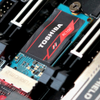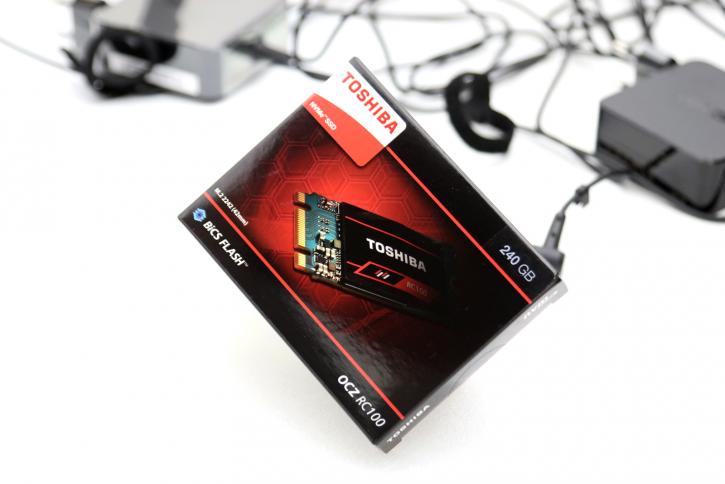Introduction
Toshiba OCZ RC100 240GB M.2 NVMe SSD
The entry-level M.2. SSD that offers NVMe performance at a low price?
Toshiba has launched its OCZ RC100 240GB M.2. NVMe SSDs, we review the 240GB model. You can look at the product series as the affordable alternative, but on NVMe nothing is slow. This affordable series really fast (relatively speaking) with a rated sequential read speed up to 1600 MB/s and sequential write speed up to 1100MB/s. That's twice to three times as fast as a regular 2.5" SSD, for the same money.
The specs are great, but will this unit deliver what it claims? M2 is the interesting form factor, these small storage units are evolving from being "just as fast" as a regular SSD towards double, triple, quadruple, quintuple, sextuple, septuple and perhaps in the future even octuple that performance. It comes in a different package, M.2. Using the PCIe lanes interface it is so much more capable as it can deal with way more bandwidth using PCI-Express lanes. As such, M.2 solutions are intended for high-end and enthusiast class motherboards and laptops.
The RC100 series M.2 SSDs are a fast series of storage technology as they offer premium performance when compared to a regular SATA3 SSD. This product that reads well at 1.6 GB/sec and writes close towards 1 GB/sec. These new M.2 units use the NVMe protocol and that means storage technology at millennium falcon hyper-fast speeds while remaining competitive in pricing.
- Max Sequential Read - Up to 1600 MBps
- Max Sequential Write - Up to 1100 MBps
- 4KB Random Read - Up to 150,000 IOPS
- 4KB Random Write - Up to 110,000 IOPS
- Endurance (TBW) up to 240 TBW 480GB model / 120 TBW 240 GB model / 60 TBW for the 120 GB model
While stability and safety of your data have become a number one priority for the manufacturers, the technology keeps advancing at as fast a pace as it does, the performance numbers a good SSD offers these days are simply breathtaking. You get between 450 MB/s to 550 MB/sec on SATA3 which is the norm for a single controller based SSD. Now in the year 2018 by combining advanced NAND Flash controller with PCIe Gen 3(8Gb/s) x2 and x4 , NvMe 1.3 interface and 3D NAND Flash, PCIe M.2 delivers sequential read speed up to 3200MB/s and sequential write speed up to 1500MB/s. A couple of years ago a 64 GB SSD was hot stuff, then slowly we moved to 120 GB, last year 240 GB for an SSD in a PC was the norm, this upcoming year we'll transition slowly to roughly 500 GB per SSD. With the market being so huge, fierce and competitive, it brought us to where we are today... nice volume SSDs at acceptable prices with very fast performance. We'll inspect the product PCB and components later on in the review in detail, but Toshiba fabs this 22x42x3.5mm (2242), M.2 SSD based on vertically stacked NAND (also referred to as 3D NAND) and are now available multiple capacities. With a low power design, this drive will be among the mainstream to faster SSDs we have ever tested.
The SSD is a Non-Volatile Memory Express (NVMe 1.2.1) M.2 form factor SSD, it has been fitted with new Vertically stacked NAND (64-layer BiCS) from Toshiba themselves, this NAND will be TLC written. The performance numbers a good SATA3 SSD offers these days are simply excellent, but with the more niche NVMe SSDs you can triple maybe even quadruple performance, which offers serious numbers. The unit follows a smaller M.2 2242 form factor (4cm) so it will fit on most ATX motherboards capable of M.2 just fine. IOPS numbers are now reaching the 150K for read and 110K for writes marker (depends on volume size / smaller is slower). At just one-tenth the weight of a traditional 2.5-inch SSD, the M.2 SSDs are ideal for users looking to upgrade their desktop or ultra-thin PCs with high-capacity, high-performance storage. You do need a modern motherboard with capable NVMe supported M.2 (PCIe 3.0 x2 connected) interface, please do check out your motherboard manufacturer for that. Yeah, have a peek, and then let's head onwards into this review.


